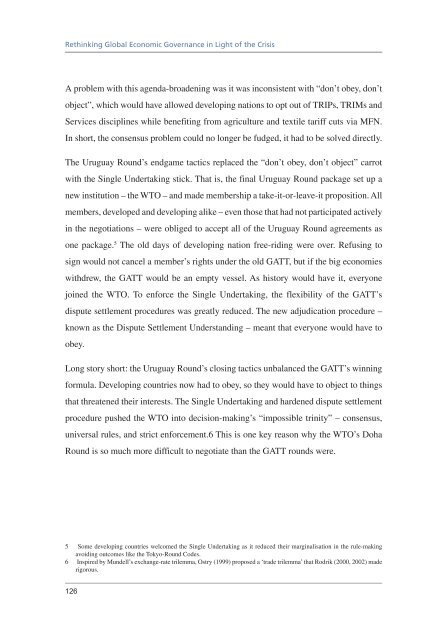Download PDF - Vox
Download PDF - Vox
Download PDF - Vox
- No tags were found...
You also want an ePaper? Increase the reach of your titles
YUMPU automatically turns print PDFs into web optimized ePapers that Google loves.
Rethinking Global Economic Governance in Light of the CrisisA problem with this agenda-broadening was it was inconsistent with “don’t obey, don’tobject”, which would have allowed developing nations to opt out of TRIPs, TRIMs andServices disciplines while benefiting from agriculture and textile tariff cuts via MFN.In short, the consensus problem could no longer be fudged, it had to be solved directly.The Uruguay Round’s endgame tactics replaced the “don’t obey, don’t object” carrotwith the Single Undertaking stick. That is, the final Uruguay Round package set up anew institution – the WTO – and made membership a take-it-or-leave-it proposition. Allmembers, developed and developing alike – even those that had not participated activelyin the negotiations – were obliged to accept all of the Uruguay Round agreements asone package. 5 The old days of developing nation free-riding were over. Refusing tosign would not cancel a member’s rights under the old GATT, but if the big economieswithdrew, the GATT would be an empty vessel. As history would have it, everyonejoined the WTO. To enforce the Single Undertaking, the flexibility of the GATT’sdispute settlement procedures was greatly reduced. The new adjudication procedure –known as the Dispute Settlement Understanding – meant that everyone would have toobey.Long story short: the Uruguay Round’s closing tactics unbalanced the GATT’s winningformula. Developing countries now had to obey, so they would have to object to thingsthat threatened their interests. The Single Undertaking and hardened dispute settlementprocedure pushed the WTO into decision-making’s “impossible trinity” – consensus,universal rules, and strict enforcement.6 This is one key reason why the WTO’s DohaRound is so much more difficult to negotiate than the GATT rounds were.5 Some developing countries welcomed the Single Undertaking as it reduced their marginalisation in the rule-makingavoiding outcomes like the Tokyo-Round Codes.6 Inspired by Mundell’s exchange-rate trilemma, Ostry (1999) proposed a ‘trade trilemma’ that Rodrik (2000, 2002) maderigorous.126














